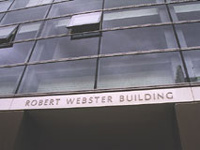|
|||||||||||||||||
| School of English, Media and Performing Arts | |||||||||||||||||

School Website Overview The School of English, Media and Performing Arts at UNSW offers students a challenging academic environment and support by enthusiastic staff with expertise and interests across the fields of contemporary English Studies, Media Production and its contexts, Music and Music Education, Film Aesthetics and History, the Analysis and History of Theatre Performance and Dance Education.
The School welcomes your inquiry on any aspect of our programs. Please email us using this address: School of English, Media and Performing Arts. Location Level 3, Sir Robert Webster Building (entry via Gate 14, Barker Street, Kensington campus)
Phone: (+61 2) 9385 4856 Undergraduate Specialisations We offer five major areas of study as part of the Bachelor of Arts degree program:
English: offers a major sequence in English, designed for students who have a genuine interest in English language and literature and wish to develop sophisticated reading skills, an appreciation of literary texts in their wider intellectual and historical contexts, and the ability to write critically and/or creatively (http://legacy.handbook.unsw.edu.au/undergraduate/plans/2008/ENGLA13400.html) Film Studies: provides students with a sophisticated understanding of the history and contemporary significance of film as a medium and cinema as an institution. The study of film is set in a broader context of screen cultures and audio-visual industries both in Australia and globally (http://legacy.handbook.unsw.edu.au/undergraduate/plans/2008/MEFTC13930.html) Media, Culture and Technology: provides students with a progressive understanding of the social, cultural and phenomenological impacts of media and communications technologies in the twentieth and twenty-first centuries (http://legacy.handbook.unsw.edu.au/undergraduate/plans/2008/MEFTB13930.html) Music: designed to develop musicianship and performing skills in association with an exploration of musicology: music history, style, musical perception and analysis, music technology, and the study of music in its cultural contexts (ethnomusicology) (http://legacy.handbook.unsw.edu.au/undergraduate/plans/2008/MUSCA13400.html) Theatre and Performance Studies: examines at how the theatrical and performing arts reflect and shape our sense of who we are. It studies theatre and performance history and current trends, allowing students to engage deeply with contemporary theatre and performance culture (http://legacy.handbook.unsw.edu.au/undergraduate/plans/2008/MEFTD13930.html). We are responsible for the core elements of the following specialised degree programs: Bachelor of Music Bachelor of Arts (Media and Communications) Bachelor of Science (Media and Communications) And for the following combined degrees: Bachelor of Music/Bachelor of Arts Bachelor of Arts (Media and Communications)/Bachelor of Laws The School offers the following four-year vocational programs: Bachelor of Arts (Dance)/Bachelor of Education program Bachelor of Music/Bachelor of Education program. List of all related specialisations (based on career) under the School of English, Media and Performing Arts is given as follows: Undergraduate Specialisations
Postgraduate Specialisations
Research Specialisations
|
|||||||||||||||||



